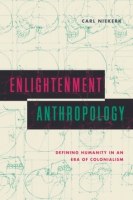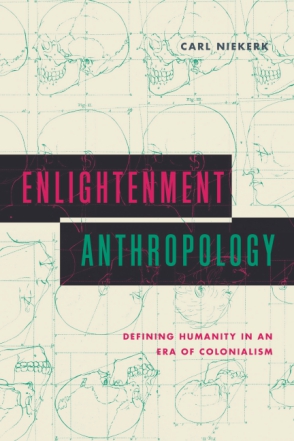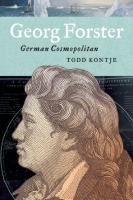Enlightenment Anthropology
Defining Humanity in an Era of Colonialism
Carl Niekerk
Finalist for the 2025 DAAD/GSA Literature and Cultural Studies Book Prize“Niekerk’s intellectual history is powerful in the simplicity of its thesis: that in its development out of natural history, the discipline we know as anthropology converged on important conclusions about the unity and diversity of the human species in its interaction with the natural environment. . . . [It] admirably brings into focus those who made significant early advances in physical and cultural anthropology.”
- Description
- Reviews
- Bio
- Table of Contents
- Sample Chapters
- Subjects
As a “natural history of man,” anthropology during the Enlightenment argued that humans across the globe belonged to a single species and that human diversity could be explained as the product of time and space, climate and geography. While this knowledge could be emancipatory—fostering curiosity rather than superiority around questions of difference among some thinkers—it also contributed to the emergence of new notions, especially “race” and “culture,” that were used by many to justify slavery and the colonial project.
With an emphasis on how we can use the ambiguities and deficiencies of the past to help guide our thinking and actions today, this book will appeal to a widely interdisciplinary audience, including anthropologists, historians and philosophers of science, intellectual historians, Germanists, and scholars of the European Enlightenment.
“Niekerk’s intellectual history is powerful in the simplicity of its thesis: that in its development out of natural history, the discipline we know as anthropology converged on important conclusions about the unity and diversity of the human species in its interaction with the natural environment. . . . [It] admirably brings into focus those who made significant early advances in physical and cultural anthropology.”
“Niekerk reconstructs the emergent discipline of anthropology as a major feature of the European Enlightenment, emphasizing not only its scientific ambitions but also its political inspiration and intention: a ‘radical’ opposition to the enslavement of non-European populations and to the excesses of colonialism. He sketches a line from Buffon to Camper, Blumenbach, and Herder, adding original characterizations of the contributions of Raynal and de Pauw. This is a rich and rewarding study.”
“In lucid and accessible prose, Niekerk situates Enlightenment anthropology at the nexus of an international debate about the definition of the human and the universal, alongside scientific discourses that rely on concepts of race and culture to limit that humanity. Persuasive and innovative, Niekerk’s book about the emerging field of anthropology and its antecedents makes a significant and original contribution to the fields of philosophy, literary and cultural studies, and history.”
“The reconstruction of the shift from climate theory to the notion of culture provides a valuable and timely contribution to an ongoing debate about race, colonialism, and the emerging science of anthropology that bridges multiple disciplines.”
Carl Niekerk is Professor of German and Affiliate Professor of French, Comparative and World Literature, and Jewish Studies at the University of Illinois Urbana-Champaign. He is the editor of The Radical Enlightenment in Germany: A Cultural Perspective and author of Zwischen Naturgeschichte und Anthropologie: Lichtenberg im Kontext der Spätaufklärung.
List of Illustrations
Acknowledgments
Note on Editions, Translations, and Abbreviations
Introduction: What Is Enlightenment Anthropology?
1. The Emerging Anthropological Paradigm: Buffon Contra Linnaeus
2. Ape, Man, and the Origins of Humankind
3. Colonialism and the Politics of Enlightenment Anthropology: De Pauw, Raynal, and Diderot
4. Race: An Enlightenment Problem
5. Culture: Herder Reads Enlightenment Anthropology
Conclusions
Notes
Bibliography
Index
Download a PDF sample chapter here: Introduction
Also of Interest
Mailing List
Subscribe to our mailing list and be notified about new titles, journals and catalogs.







